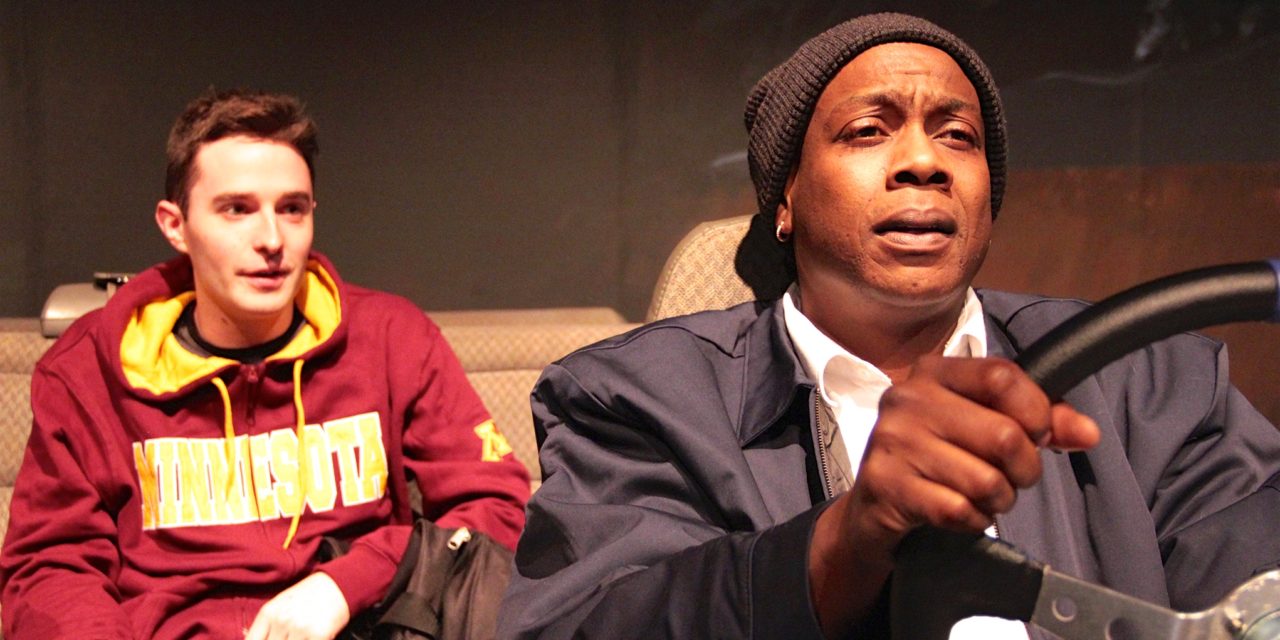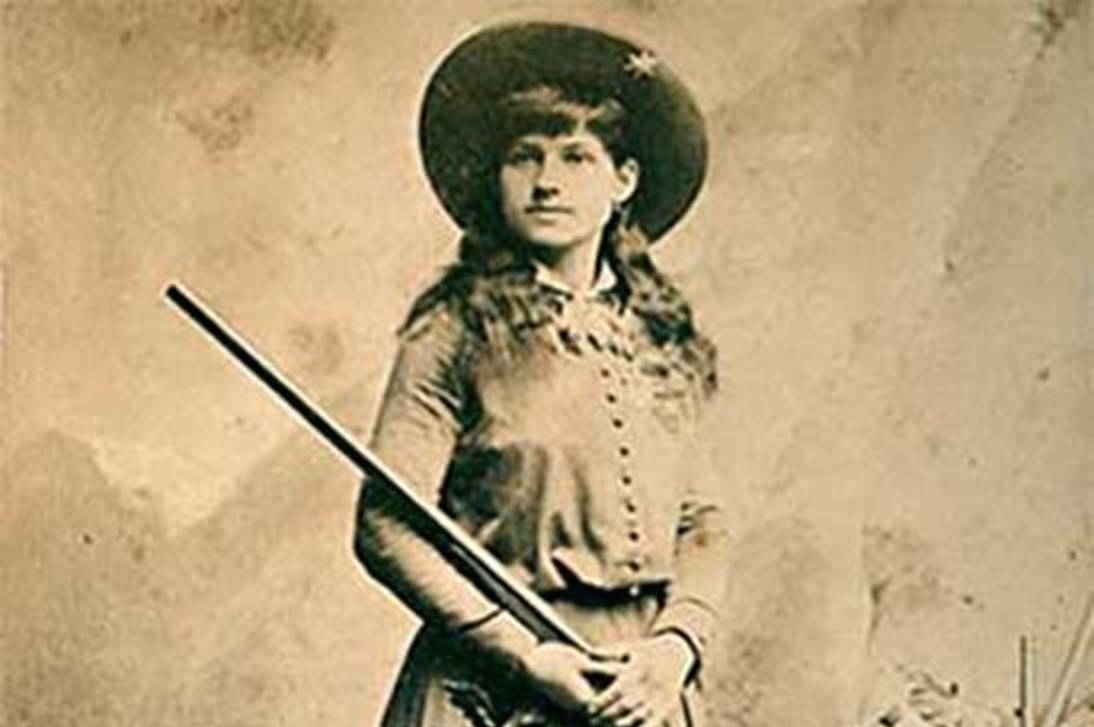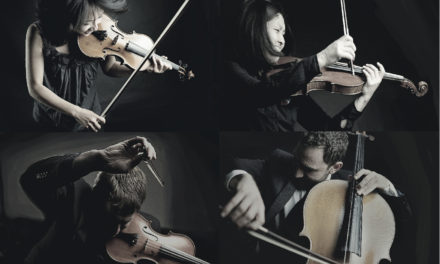(Above: Connor French and Jasper Howard star in Damascus, onstage at Oregon Contemporary Theatre through April 14)
By Kelly Oristano
First things first: Bennett Fisher’s Damascus, now making its West Coast premiere at Oregon Contemporary Theatre, is a very good play — a gripping, taut, thoughtful suspense drama — superbly produced by some of OCT’s best designers and excellently acted, notably by its two leads, Jasper Howard and Connor French.
Second things second: I cannot in good conscience tell you very much about it. A proper first viewing demands that you go in not knowing where the road will lead, and I cannot deprive you of that.
Here’s what can be told: Hassan (Mr. Howard) is a Minneapolis airport shuttle driver and struggling entrepreneur. As the curtain rises, he’s prepping his van for another day of work, complaining to his supervisor about how oppressively thin the margins of his operation are. He made $106 dollars yesterday and put almost that much back in the gas tank. He has to pay interest on the franchise loan, insurance, cleaning, repairs, tolls. If he takes a full van to one hotel he makes money, but if he takes a half-full van to multiple destinations, it’s break even if he’s lucky. He’s working such long hours to keep up that he’s taken to sleeping in the van to save commute time. His supervisor offers him Canadian uppers cannily stored in an Ibuprofen bottle, which he declines, but pockets for later
During an illicit van nap, Hassan is shocked awake by Lloyd, (Mr. French) a U-Minn Gopher who wants Hassan’s shuttle services in the worst way. Lloyd’s flight home was canceled, and he thinks he can get Hassan to take him to O’Hare, the only other chance for him to get home by a self-imposed deadline. Hassan demurs for a time; he’s not supposed to leave the Minneapolis-St. Paul area, but when Lloyd offers a few hundred bucks for the express run — and Hassan is able to sense his desperation and talk him up a few hundred more — a deal is struck, and we’re on the road.
It’s probably safe to note here that about 97 percent of the play happens inside Hassan’s shuttle van, and that Hassan and the van are onstage for 100 percent of the play. Director Tara Wibrew and set designer Michael Teague have devised a winch rig that lets Hassan’s skeletal van move about the stage almost freely. We can see it side on when Hassan is cleaning up or gassing up, and straight on when Hassan and Lloyd are making good time on I-94 and I-90. But what’s really impressive about this mobility is how it’s used to amp up the drama. When the story takes a turn, the van can take a turn. When we learn something new about Lloyd, a simple turn of the van changes our viewing angle and casts Lloyd in a new light.
Connor French is a perfect choice for the role of Lloyd. I can’t say much about Lloyd, but French is fully believable as a college student desperate to get home to his ailing mother, and then just as believable as other things that stand in direct conflict with that: privileged, devious, whiny, manipulative, fanatical, perhaps too intelligent for his own good. He can be clean and earnest as the van is barrelling down the highway right at us, and then potentially sinister as the van turns and we see him in three-quarter profile. French is called upon to display extremes of intellect and emotion and does so with aplomb
Jasper Howard is so completely Hassan, inhabiting the character so naturally and with no discernable artifice, that there were moments I felt invasive of his privacy. He’s occasionally left alone onstage with the van, to clean it, nap in it, or just wait in it for Lloyd to come back from the convenience store with snacks. Watching this person who shouldn’t be being watched was one of the strangest experiences I have had in a theater. It’s disconcerting, but done for a pointed reason. When he’s interacting with Lloyd, we get a sense of the deep wisdom life has granted Hassan, and a sense of how far behind he is on the balance sheet. He’d love to tell Lloyd off a time or two, and Lloyd frankly deserves it, but this $600 ride may put him back above the line, so we see him swallow his truth a few times before it all comes back out in the end.
There are four more characters in the play, smartly played by two more excellent actors. Donella-Elizabeth Alston plays Hassan’s supervisor and a woman they meet on the road, and both are distinct, clever characterizations. Lisa Roth plays a nosy gas station attendant who turns the story on its ear and another character who wraps up some loose ends at the play’s close. Roth’s thoughtful choices serve the story well in both roles.
Wibrew’s direction aims to find the odd stretched and contracted sensations of time one feels on a road trip. Lloyd and Hassan will talk almost manically for a few minutes, then have long stretches of little or no interaction, as happens on the road. Time also jumps forward and the end starts to come at us quicker than we can be ready for. Wibrew has assembled an excellent design team. Teague’s set and Michael A. Peterson’s lighting design are chief drivers of the “reality” of this road trip, and Taylor Freeman’s sound design is important in communicating the story and maintaining the stage illusion
There’s a saying in boxing: Styles make fights, and styles make fighters. The interactions between Howard’s Hassan and French’s Lloyd in this ring devised by Bennett Fisher are theatrical pugilism at its finest. We see them both empty their entire arsenals. We see them exhausted and holding on to each other to remain standing. We see them both on the ropes, we see them both on the mat, we see them both triumphant, but what remains with me is the interaction of their styles. It’s not even always a “good” match up; sometimes it’s quite odd.
But you can’t take your eyes off it for a second, and it does NOT end in a judges’ decision.
Damascus
When: 7:30 p.m. on March 29-30 and April 4-6 and 11-13; matinees at 2 p.m. on April 7 and 14
Where: Oregon Contemporary Theatre, 194 W. Broadway, Eugene
Tickets: $20, $30, or $40 (student tickets for $15), available at the box office, 541-465-1506, or online at octheatre.org












